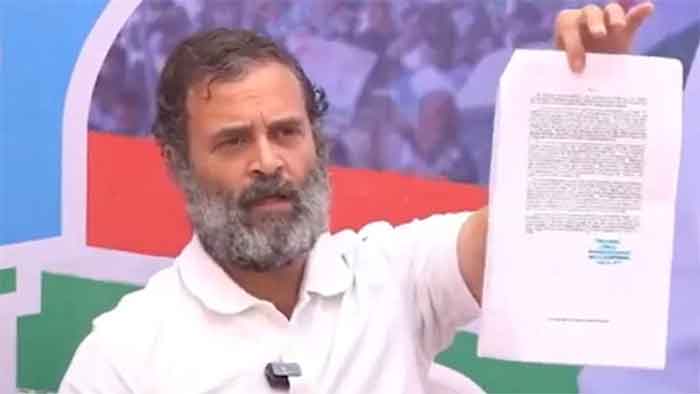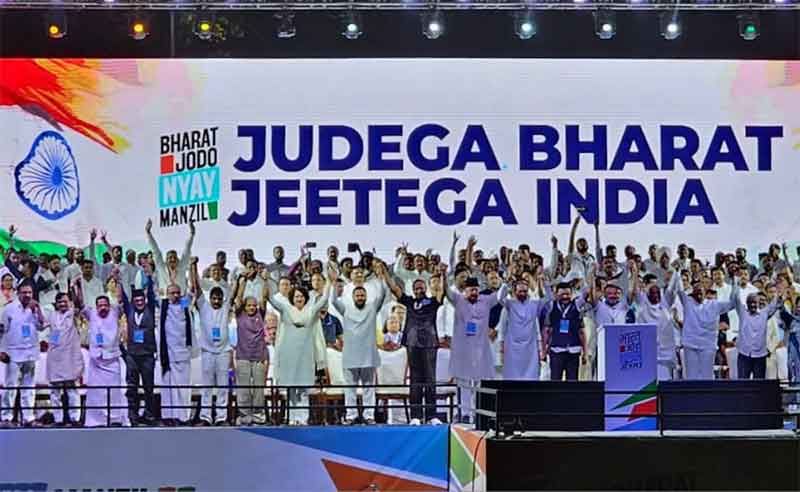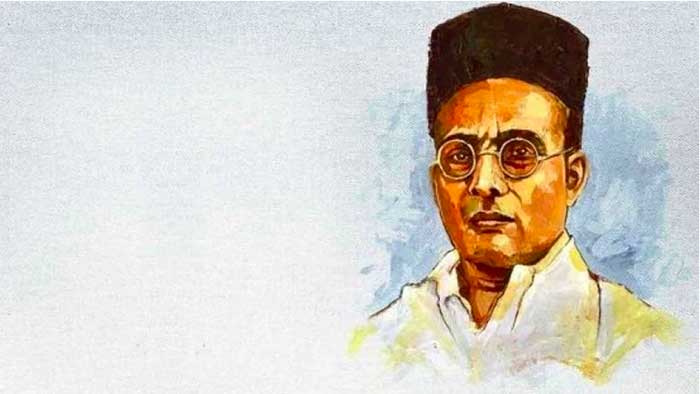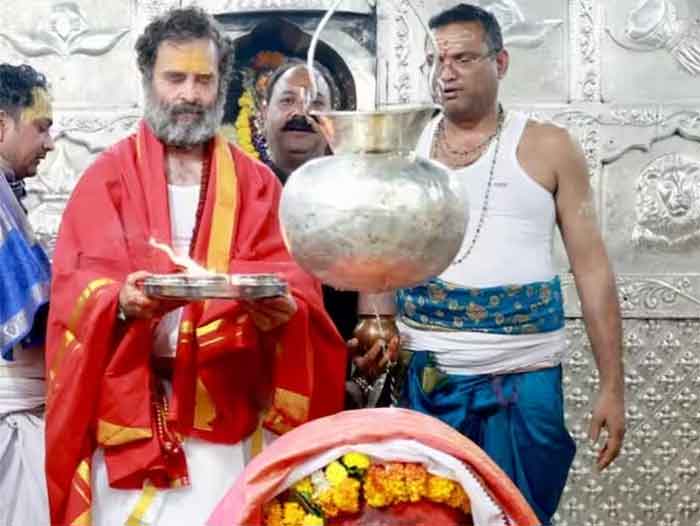
(Everything in this article is just repetition. I have been saying all this since 1991-92. It is obvious that the Congress and the RSS/BJP do not like my ideas. But most socialists, advocates of social justice and communists also dislike my thoughts. I watch their measures and efforts to deal with the present crisis with interest. I respect them and also participate. But we fall behind again and again, and the crisis goes ahead. Instead of being a solution-provider, we are seen to be a part of the crisis. How long will this last? Perhaps if the new generation thinks differently, things will be better!)
1
To say that modern Indian society and politics is passing through the deepest crisis ever will merely be a repetition. This crisis is deeper than the spreading of communal hatred we witness around us. Rather, the business of communal hatred is flourishing by taking its manure and water from that deep crisis. That crisis is of neo-colonial slavery, which is getting progressively growing roots since 1991. When a society becomes empty of the spirit of freedom – political, civil and personal – it creates a tumult of politics of symbols. Such a society, shying away from the identification, understanding and commitment to get out of it, is cursed to hoist pictures of selected icons and raise slogans in their glory. Such a society is also cursed for propagating the borrowed Europe-America’s stale formulas, systems and equipments (including digital) as self-reliance while flowing in the ongoing floods of privatization-liberalization. Such a society is bound to enthusiastically sell the precious resources and labour of the country to domestic and foreign private companies at throwaway prices. Same is the condition of today’s Indian society. The new India alias Hindu-Rashtra is being built in this way. The makers of new India share only one common commitment – elimination of the spirit of freedom and the idea of equality from society.
Today hardly any leader or famous intellectual associated with the power politics believes that political slavery comes through the foreign capital along with the loans and conditions associated with it; And private capital in the nexus with foreign capital thrives on the loot of India’s national assets and taxpayers’ money, done with the help of governments. Here are two recent examples: One, the Prime Minister’s proud statement at the foundation laying ceremony of the Airbus-Tata joint venture in Gujarat that his investment-friendly policies had attracted direct foreign investment (FDI) in 60 (public) sectors and 31 states. He exhibits the courage to bring 100 percent direct foreign investment in every sector of the country! Two, those paragraphs of the New Education Policy (NEP) which have been lifted from foreign sources as it is, and the courses and pedagogic systems/methods of education based on foreign copying. Had the spirit of freedom remained in the Indian society, after these two cases alone, a decisive struggle would have been raised against neo-imperialism. But it is embroiled in the politics of symbols.
I have mentioned this fact earlier in various contexts that the politics of symbols is meant to hide the extinction of the very spirit of freedom that has happened in the last three decades. The additional dimension of the RSS/BJP in this brand of politics is that they want to hide their role of supporting the British by not participating in the freedom movement. While it could also be possible that they would have reformed their pre-independence role by, honestly, playing a role in favour of strengthening the spirit of freedom in the independent India. By doing this they could have build their credibility. Such credibility that does not have to depend on political power. But after getting political power, they have thrown the entire freedom movement and its leaders into a futile controversy. The sad thing is that the entire opposition seems to be caught in this trap. The controversy arising again and again on Vinayak Damodar Savarkar is a manifestation of the same trend.
Whenever a political controversy arises about Savarkar, pro-Savarkar, anti-Savarkar and scholars adhering to middle path appear in the media with their respective arguments – Savarkar’s personality happened to be full of contradictions, the anti-British revolutionary phase of Savarkar, tactical retreat by him through apologies written in order to seek his release from Cellular Jail, Savarkar, the rationalist, the propagator of Hindutva doctrine, a saviour of Hindu society from the bigotry of Muslims, who tried to stop conversions of Hindus by Muslims and Christians, who continuously opposed Gandhi’s obsession for Hindu-Muslim unity so on and so forth. Politicians also make their statements and arguments in the controversy. It is not necessary to go into the details of all of them here.
2
I am of the opinion that the opponents of Savarkar should not drag him into controversy again and again. Not because doing so benefits the RSS/BJP. Rather, if communal politics will remain in India, Savarkar will also remain. He along with Mohammad Ali Jinnah was the originator of the two-nation theory on the basis of Hinduism and Islam. The question is, will the stains of Indian politics badly soiled by communalism be washed away soon? The simple answer would be, if corporate capitalism will run even against the Constitution, communal politics will also be there; And because of that the communalism of the colonial period will also get legitimacy and acceptance in public domain.
Looking at the present reality objectively, it seems that the communal politics is not going to wither away in India in the near future, because there is a consensus among the ruling-class on corporate capitalism. In the last three decades, there has been a hand-to-hand relationship between corporate politics and communal politics. This phenomena has been termed as corporate-communal nexus. It is not so much a matter of concern that the right-wing remains in India. Right-wing ideas and politics have a presence and role in almost all countries. But there is a communal, hypocritical and superstitious right-wing in India. The secular and progressive camp of the civil society has put its stamp on this communal, hypocritical and superstitious right-wing by establishing the Aam Aadmi Party in the political arena.
The RSS/BJP and Shiv-Sena consider Savarkar as their ideal. They like and admire Savarkar’s bravery, so no one should have any objection in this. The communal politics also seeks its ideological basis, and they find it in the thoughts and role of Savarkar. The truth of Savarkar’s apologies is recorded in the history. Despite this, the RSS/BJP consider him swatantrya veer (a brave freedom fighter), so this is their problem. Even Bhagat Singh could have apologised to the British. Chandrashekhar Azad could have saved his life by surrendering before the police instead of taking his own life. But they didn’t do that. Their path was different. They did not want to achieve the freedom of the country through cowardice and deceit.
Anyone who travels through the thoughts and activities of Savarkar would easily know that Savarkar actually considered cowardice and deceit as an integral part of his strategy. There has been no dearth of people doing this in the history of India and the world. If any organization or person accepts Savarkar’s thoughts and methods as their ideal and makes him their icon, then it is their choice. Instead of feeling bad about it, it would be more appropriate to maintain insistence on transparency in thoughts and mode of action. If there was such honesty in the progressive and secular camp, then this crisis would not have been so severe. Even now, this camp seems to be roaming within the politics of capitalist-communal nexus. This camp, in fact, has played the biggest role in pushing back the alternative politics that emerged against the New Economic Policies during nineties itself.
The RSS/BJP should not refer Gandhi and Mrs. Indira Gandhi in defense of Savarkar. Gandhi had clearly stated that he has no enemies. He was also a well wisher of Savarkar. If the Savarkarists interpret Gandhi’s advice to Savarkar that Gandhi asked them to write an apology, then this is their interpretation. The message sent by Mrs. Indira Gandhi on Savarkar’s birth centenary as the Prime Minister of the country is a fine example of protocol. Had she come across the classified files about Savarkar’s apologies that came to the fore after 1984, she would probably have written a similar message. Whether postage stamp was issued on Savarkar in the past or he is given Bharat-Ratna at present, there is no need to worry about it. All this will remain if communal politics remains in the Indian political arena.
When a dispute arises on Savarkar, Gandhi always comes in it. Gandhi was the tallest leader of the Congress, a forum for the freedom struggle, if not universally accepted. This position of him had been the result of his long political career full of ups and downs. It was natural for leaders inside and outside the Congress to have differences with Gandhi. Like every great leader, Gandhi too had his own style and logic while dealing with the people. In the event of differences and opposition, he used to stick to his style and arguments to get his point across. In this whole exercise, he neither excommunicated anyone, nor did he himself run away.
The leaders who claimed to be ‘protector of Hindu interests’ or ‘protector of Muslim interests’ could never fit in with Gandhi. People like Balakrishna Shivram Munje, Baliram Hedgewar, Jinnah run away from the Congress after being troubled by Gandhi’s personality. On the other hand people like Savarkar and Madhav Sadashivrao Golwalkar tried to measure their stature with that of Gandhi; and failing that, kept trying to destroy Gandhi, his thoughts and mode of action. Savarkar did not give up this effort even after Gandhi’s assassination. All those who had differences or competition with Gandhi met a common fate – they all found solace in the lap of the colonial power.
Savarkar read a 57-page statement in his defense, clearly refusing to recognize Nathuram Godse in the court constituted for the trial of Gandhi’s murder. It is believed that Savarkar, who escaped the charge of murder, also wrote Godse’s last statement, in which he tries to demolish Gandhi after his death. James W. Douglas has written, ‘Critics say that what is shown and recited to us as Godse’s last statement was actually written by his mentor Savarkar. This was very important for them. Because Savarkar and Nathuram Godse both knew it that this statement would be their greatest defense in later years.’ An indignant Douglas writes further, ‘In a crowded court, a murderer humiliated the man who was also the father of our nation and who was no longer in the world to speak! … The accused himself was accusing Gandhi, was justifying it (the murder) and shamelessly putting in the dock the man whom he had just murdered, in front of the whole world.’ Therefore, it would be better that both pro-Savarkar and anti-Savarkar people should not bring Gandhi while getting embroiled in the controversy.
3
BJP leaders of Maharashtra say that Maharashtra belongs to Savarkar. So does Maharashtra not belong to Sane Guruji? Doesn’t it belong to Baba Saheb? Regionalism of symbols is not a good thing. The politics of symbols will get more dirty by this. In this dispute only the learned people of Maharashtra should clarify that to whom Maharashtra belongs?
Savarkar suffered a lot of tortures, there is no need to feel bad for those who believe so. Lakhs of Indians lost their lives in the 1857 war. Entire families/villages perished. The properties were confiscated. The havoc created by the British after their victory, without any discrimination between the guilty and the innocent, can hardly be found in the history of the world. Those who suffered torture or sacrificed were not to get any compensation or pension. While the kings-princes, businessmen-moneylenders, landlords, administrators who supported the British became enormously rich. The mind-set that looks at the Indian freedom struggle through the lens of segregation and contempt fails to see the sufferings and sacrifices that the participants in the Indian freedom struggle (including the revolutionary movement) had to go through.
Coming out of this mind-set, people will be able to understand the importance of the sacrifices given in the freedom movement as well as the values associated with it. Then maybe the spirit of freedom against neo-colonialist slavery can also be sparked.
(The author associated with the socialist movement is a former teacher of Delhi University and a former fellow of Indian Institute of Advanced Study, Shimla)

















































